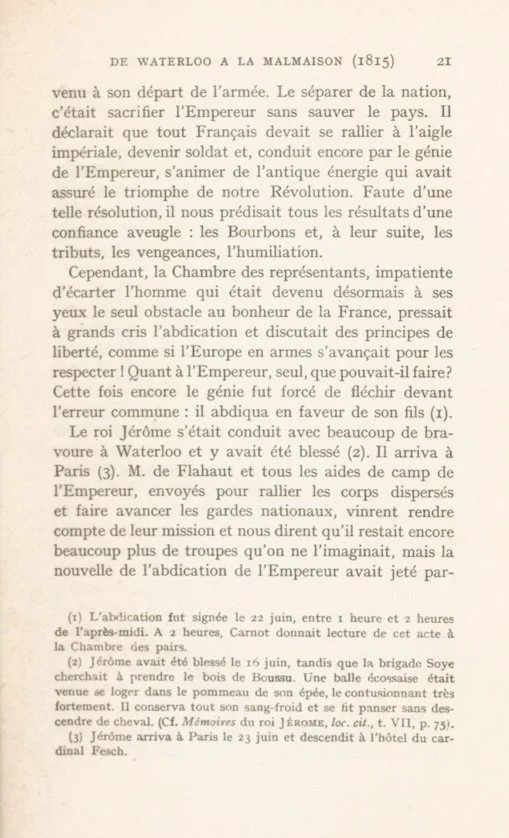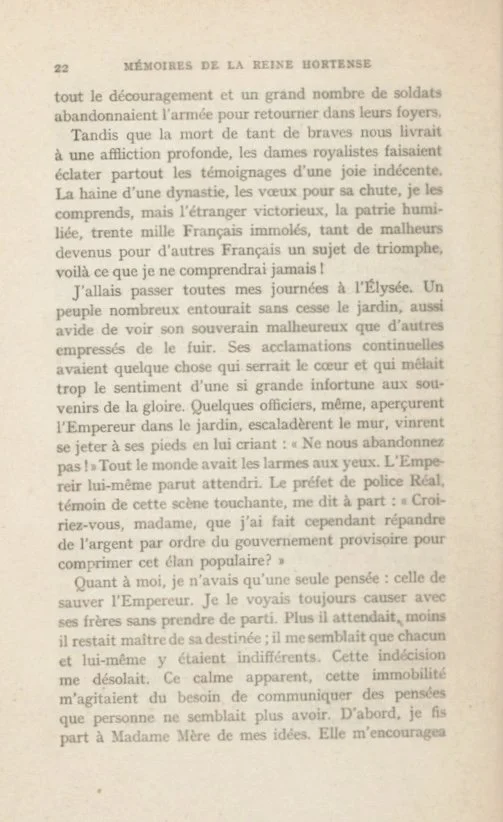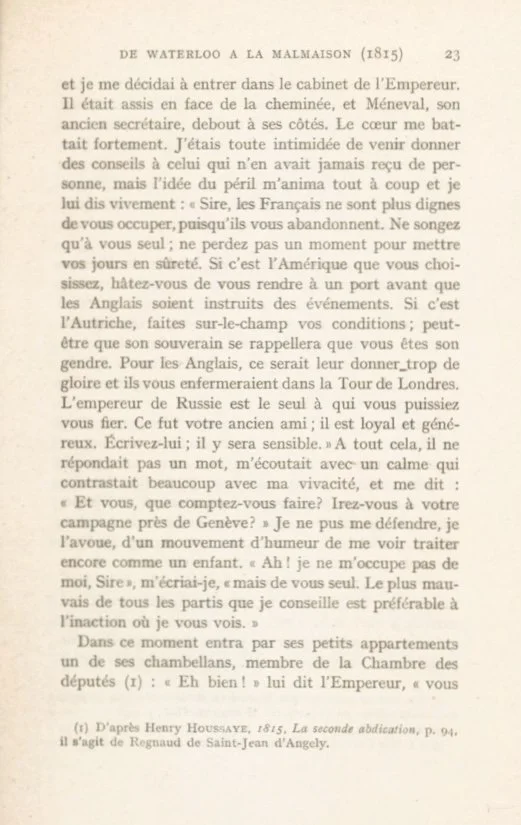Let’s have another look at Hortense’s Memoirs. If you want to read the book it is available for free at the side bar in English and French. Use the widget on the sidebar to translate the text below into pretty much any language.
Napoleon and Hortense had a very strange relationship. She married someone she didn’t love simply because he wanted her to. She raised her son to vindicate Napoleon and that work became the Second Empire. Hortense was very obsessed with Napoleon and her first thought - as you can see below - was always for him.
If the people who actually care about each other unite, we can build a better world. We can co-create a new reality where the traps are broken down and finally thrown away. We just need to start by making sure that just laws are enforced now. Our slavers are criminals to an outrageous degree. They have all exposed themselves continually over the course of this operation that they launched against the public starting in 2020. Would you like to see them finally caught? It’s up to you to do your part to save us all. I will never accept being treated as if this planet is a plantation and that I am like livestock or a slave on someone else’s property and I hope you won’t either. Wouldn’t you like to be a hero? Wouldn’t you like to finally see some justice in this world?
Hortense’s memoirs continues:
Meanwhile the Chamber of Representatives in a hurry to discard the man who in its opinion had become the sole obstacle that stood between the French people and peace clamored for an abdication.
At the same time, it discussed the principles of political freedom as though armed Europe were advancing to enforce this ideal. As for the Emperor, what could he, alone as he was, hope to accomplish?
Once more the genius was obliged to bow before the mistaken judgment of the mob. He abdicated in favor of his son. King Jerome had shown his courage at Waterloo and been wounded there.
He returned to Paris. Monsieur de Flahaut and all the other aides-de-camp whom the Emperor had dispatched to rally the scattered troops and mobilize the National Guard came to report the result of their mission.
They announced that there were many more troops available than we believed, but that the news of the Emperor's abdication had spread discouragement everywhere and many of the soldiers had thrown away their weapons and returned to their homes. While the news of the death of so many heroes had plunged us into profound mourning, the ladies who supported the royalist cause displayed an absolutely indecent rejoicing.
I can understand hatred for a certain dynasty, an ardent desire to see it overthrown, but that people should celebrate a victory won by foreign troops over our national forces, the defeat of our country and the sacrifice of the lives of thirty thousand Frenchmen, that is something I cannot understand. I spent all my time at the Elysée.
A crowd constantly stood outside the garden. The common people were as eager to catch a glimpse of their sovereign in the hour of his distress as the upper classes were to avoid him.
The constant cheering of this crowd had something poignant about it, since in this hour of distress it recalled the memories of the past. Some officers, catching sight of the Emperor walking about the garden, even scaled the wall, and throwing themselves at his feet exclaimed, "Do not abandon us."
The Emperor himself appeared touched by this devotion. Prefect of Police Real, who witnessed this scene, told me privately: "And to think, madame, that, acting on orders received from the Provisional Government, I had money distributed to quiet this patriotic ardor."
As for me my one thought was: How can the Emperor be saved? I watched him talking on and on with his brothers without ever reaching a decision. The longer he waited, the more he ceased to be master of his fate, but it seemed that no one, not even he, cared about what happened to him.
I was annoyed by this state of indecision. This apparent immobility roused in me a desire to take active steps. First of all, I told Madame Mere my ideas. She approved of them, and I decided to enter the Emperor's study. He was sitting facing the fireplace.
Meneval, his former secretary, stood beside him. My heart beat violently. The thought that I was about to offer advice to the man who had never accepted it from anyone intimidated me. But the idea of the danger he was in conquered my shyness and I said to him quickly "Sire, since the French nation thus abandons you, it does not deserve your consideration. Only think of what is best for you personally. Do not lose an instant in insuring your own safety. If it is America you choose as a refuge, hurry off to a port before England will have learned of your decision. If you prefer Austria, fix your terms without delay. Perhaps its ruler may remember you are his son-in-law. As for the English they would consider it too great an honor if you appealed to them. They would imprison you in the Tower of London. The Emperor of Russia is the one man you can trust. He was once your friend. He is loyal and generous. Write to him. He will appreciate it."
The Emperor did not answer a word. He listened with a calmness that contrasted with my nervousness and then said: "And you? What are you planning to do? Will you go to your country-place near Geneva?"
I admit I could not resist feeling a momentary irritation to be still treated as though I were a child. "Ah, Sire, I do not care what becomes of me: I care only about your fate. Even the least favorable of the courses I suggest is better than the apathy which has come over you."
The original French is available below:





